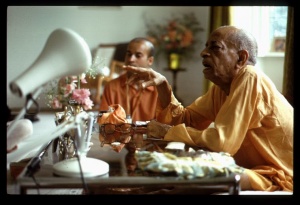SB 1.17.9: Difference between revisions
No edit summary |
(Vanibot #0054 edit - transform synonyms into clickable links, which search similar occurrences) |
||
| Line 24: | Line 24: | ||
<div class="synonyms"> | <div class="synonyms"> | ||
''mā'' | ''[//vanipedia.org/wiki/Special:VaniSearch?s=mā&tab=syno_o&ds=1 mā]'' — do not; ''[//vanipedia.org/wiki/Special:VaniSearch?s=saurabheya&tab=syno_o&ds=1 saurabheya]'' — O son of Surabhi; ''[//vanipedia.org/wiki/Special:VaniSearch?s=atra&tab=syno_o&ds=1 atra]'' — in my kingdom; ''[//vanipedia.org/wiki/Special:VaniSearch?s=śucaḥ&tab=syno_o&ds=1 śucaḥ]'' — lamentation; ''[//vanipedia.org/wiki/Special:VaniSearch?s=vyetu&tab=syno_o&ds=1 vyetu]'' — let there be; ''[//vanipedia.org/wiki/Special:VaniSearch?s=te&tab=syno_o&ds=1 te]'' — your; ''[//vanipedia.org/wiki/Special:VaniSearch?s=vṛṣalāt&tab=syno_o&ds=1 vṛṣalāt]'' — by the ''śūdra''; ''[//vanipedia.org/wiki/Special:VaniSearch?s=bhayam&tab=syno_o&ds=1 bhayam]'' — cause of fear; ''[//vanipedia.org/wiki/Special:VaniSearch?s=mā&tab=syno_o&ds=1 mā]'' — do not; ''[//vanipedia.org/wiki/Special:VaniSearch?s=rodīḥ&tab=syno_o&ds=1 rodīḥ]'' — cry; ''[//vanipedia.org/wiki/Special:VaniSearch?s=amba&tab=syno_o&ds=1 amba]'' — mother cow; ''[//vanipedia.org/wiki/Special:VaniSearch?s=bhadram&tab=syno_o&ds=1 bhadram]'' — all good; ''[//vanipedia.org/wiki/Special:VaniSearch?s=te&tab=syno_o&ds=1 te]'' — unto you; ''[//vanipedia.org/wiki/Special:VaniSearch?s=khalānām&tab=syno_o&ds=1 khalānām]'' — of the envious; ''[//vanipedia.org/wiki/Special:VaniSearch?s=mayi&tab=syno_o&ds=1 mayi]'' — while I am living; ''[//vanipedia.org/wiki/Special:VaniSearch?s=śāstari&tab=syno_o&ds=1 śāstari]'' — the ruler or subduer. | ||
</div> | </div> | ||
Latest revision as of 18:04, 17 February 2024

A.C. Bhaktivedanta Swami Prabhupada
TEXT 9
- mā saurabheyātra śuco
- vyetu te vṛṣalād bhayam
- mā rodīr amba bhadraṁ te
- khalānāṁ mayi śāstari
SYNONYMS
mā — do not; saurabheya — O son of Surabhi; atra — in my kingdom; śucaḥ — lamentation; vyetu — let there be; te — your; vṛṣalāt — by the śūdra; bhayam — cause of fear; mā — do not; rodīḥ — cry; amba — mother cow; bhadram — all good; te — unto you; khalānām — of the envious; mayi — while I am living; śāstari — the ruler or subduer.
TRANSLATION
O son of Surabhi, you need lament no longer now. There is no need to fear this low-class śūdra. And, O mother cow, as long as I am living as the ruler and subduer of all envious men, there is no cause for you to cry. Everything will be good for you.
PURPORT
Protection of bulls and cows and all other animals can be possible only when there is a state ruled by an executive head like Mahārāja Parīkṣit. Mahārāja Parīkṣit addresses the cow as mother, for he is a cultured, twice-born, kṣatriya king. Surabhi is the name of the cows which exist in the spiritual planets and are especially reared by Lord Śrī Kṛṣṇa Himself. As men are made after the form and features of the Supreme Lord, so also the cows are made after the form and features of the surabhi cows in the spiritual kingdom. In the material world the human society gives all protection to the human being, but there is no law to protect the descendants of Surabhi, who can give all protection to men by supplying the miracle food, milk. But Mahārāja Parīkṣit and the Pāṇḍavas were fully conscious of the importance of the cow and bull, and they were prepared to punish the cow-killer with all chastisement, including death. There has sometimes been agitation for the protection of the cow, but for want of pious executive heads and suitable laws, the cow and the bull are not given protection. The human society should recognize the importance of the cow and the bull and thus give all protection to these important animals, following in the footsteps of Mahārāja Parīkṣit. For protecting the cows and brahminical culture, the Lord, who is very kind to the cow and the brāhmaṇas (go-brāhmaṇa-hitāya), will be pleased with us and will bestow upon us real peace.